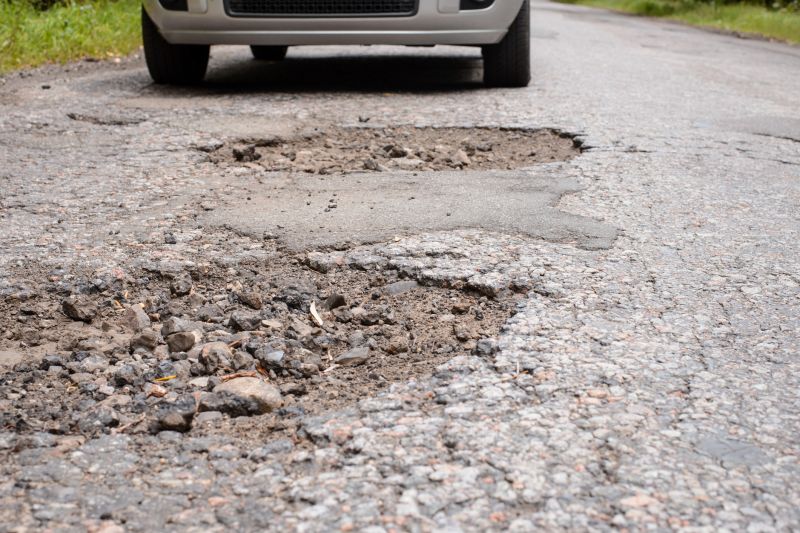Favorite Parking Lot Pothole Repair Tools for Contractors and DIYers
Discover versatile and effective products that help both professionals and homeowners tackle pothole repairs with confidence.
 Maintaining a parking lot involves addressing surface imperfections such as potholes, which can develop over time due to weather, traffic, and material wear. Selecting the appropriate products for pothole repairs is essential for ensuring a smooth, safe, and durable surface. Various repair materials and tools are available to suit different sizes and types of potholes, from small surface cracks to large, deep cavities. Proper repair not only enhances the appearance of the lot but also helps prevent further deterioration and potential liability issues.
Maintaining a parking lot involves addressing surface imperfections such as potholes, which can develop over time due to weather, traffic, and material wear. Selecting the appropriate products for pothole repairs is essential for ensuring a smooth, safe, and durable surface. Various repair materials and tools are available to suit different sizes and types of potholes, from small surface cracks to large, deep cavities. Proper repair not only enhances the appearance of the lot but also helps prevent further deterioration and potential liability issues.
Top Overall Option
Cold Mix Asphalt Patch
A versatile and user-friendly choice, cold mix asphalt patch is suitable for a variety of pothole sizes and can be applied without heating. It provides a convenient, ready-to-use solution for quick repairs, especially in situations where hot mix asphalt is not available. When properly prepared and compacted, it can offer a durable surface, making it a popular option for maintenance crews and property managers seeking efficient repair methods.
Types of Products For Parking Lot Pothole Repairs
Cold Mix Asphalt
Pre-mixed asphalt suitable for quick, temporary or semi-permanent repairs on potholes and cracks.
Hot Mix Asphalt
A traditional repair material that requires heating before application, ideal for long-lasting fixes on larger potholes.
Pothole Repair Kits
Complete kits that include all necessary components for efficient pothole patching, often with pre-measured materials.
Asphalt Cold Patch
Ready-to-use cold patch materials designed for easy application and quick setting.
Polymer-Modified Asphalt
Enhanced asphalt mixes with added polymers for increased flexibility and adhesion.
Asphalt Repair Concretes
Specialized repair compounds that combine asphalt and concrete properties for specific repair needs.
Sealant Coatings
Protective coatings applied over repaired areas to prevent water infiltration and further damage.
Cold Patch with Aggregate
Patch materials that include aggregate for added stability and durability.
Infrared Asphalt Repair Equipment
Tools that heat existing asphalt to allow seamless blending with new material for durable repairs.
Asphalt Crack Fillers
Products designed to fill and seal surface cracks before pothole repair to prevent expansion.
Polymer-Modified Cold Patch
Cold patch materials enhanced with polymers for improved adhesion and flexibility.
Quick-Set Pothole Patches
Fast-curing patches suitable for urgent repairs requiring minimal downtime.
Patch and Sealant Combinations
Integrated products that combine patching material with sealing agents for comprehensive repair.
Fiber-Reinforced Asphalt
Asphalt mixes reinforced with fibers to improve tensile strength and crack resistance.
Cold Asphalt Emulsion
Emulsified asphalt that can be applied cold, offering ease of use for minor repairs.
Polymer-Modified Cold Mix
Cold mix asphalt enhanced with polymers for better performance under traffic load.
Popular Choices
A widely used choice for quick and easy pothole repairs, suitable for various sizes.
Favored for its convenience and versatility, especially in emergency repairs.
Complete kits that simplify the repair process with pre-measured materials.
Preferred for long-term repairs, especially on larger or more severe potholes.
Popular among professionals for seamless, durable repairs that blend with existing pavement.
Commonly used to protect repaired areas from water and weather damage.
Chosen for increased flexibility and adhesion in high-traffic areas.
Valued for rapid curing, minimizing downtime for parking lots.
Popular for its enhanced crack resistance and durability.
Often used as a preparatory step before patching larger potholes.
Convenient for minor repairs and surface sealing.
Provides added stability for potholes in high-traffic zones.
Popular for its improved performance in various weather conditions.
Combines patching and sealing in one application for efficiency.
Chosen for specific repair needs requiring concrete-like durability.
When considering repair options, it is important to evaluate the specific characteristics of the pothole, including its size, depth, and location. For small to medium-sized potholes, patching compounds and cold mix asphalt are commonly used due to their ease of application and quick setting times. Larger or more severe potholes may require hot mix asphalt or specialized repair kits that provide a more permanent solution. Surface preparation, such as cleaning and removing loose debris, is a critical step regardless of the product chosen.
In addition to the repair materials, various tools and accessories can facilitate the process. These include tampers for compacting patches, shovels for spreading materials, and sealants to prevent water infiltration. Proper application techniques and thorough surface preparation contribute significantly to the longevity of the repair. It is also advisable to consider weather conditions, as some products perform better under certain temperatures and humidity levels. Regular maintenance and timely repairs are key to preserving the integrity of parking lot surfaces and minimizing long-term costs.
Key Buying Considerations
- Size and depth of the pothole to determine the appropriate repair material.
- Type of pavement surface and compatibility with repair products.
- Weather conditions during application to ensure proper curing and adhesion.
- Ease of application, especially for DIY repairs or professional use.
- Durability and expected lifespan of the repair material.
- Speed of curing or setting time to minimize traffic disruptions.
- Availability of necessary tools or accessories for application.
- Cost-effectiveness considering long-term maintenance needs.
- Compatibility with existing surface treatments or sealants.
- Environmental conditions such as moisture or temperature fluctuations.
- Required surface preparation steps for optimal results.
- Level of traffic in the parking lot to select a suitable repair solution.
- Potential need for sealing or additional protective coatings post-repair.
- Storage and shelf life of repair materials.
- Regulatory or safety standards that repair products must meet.
